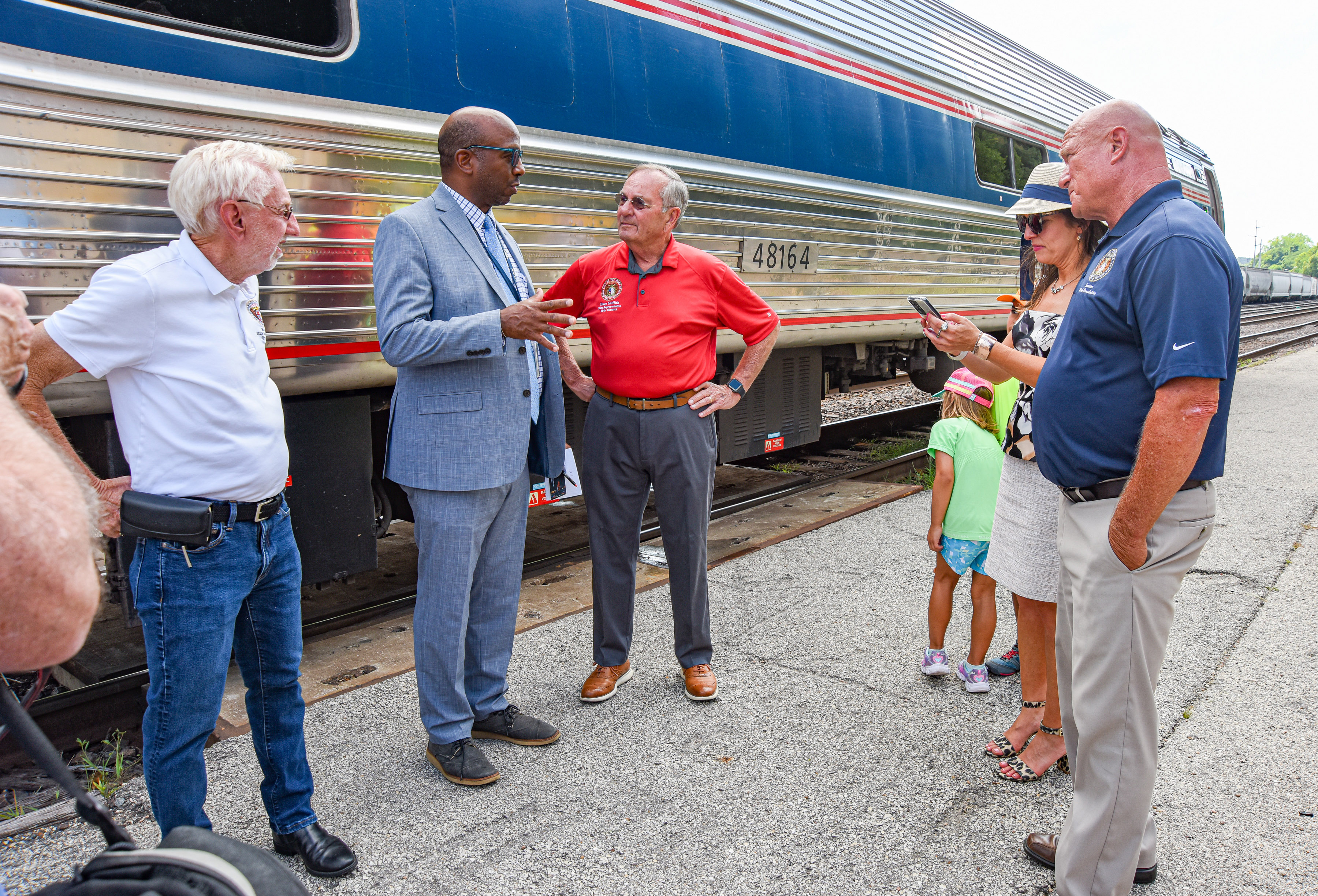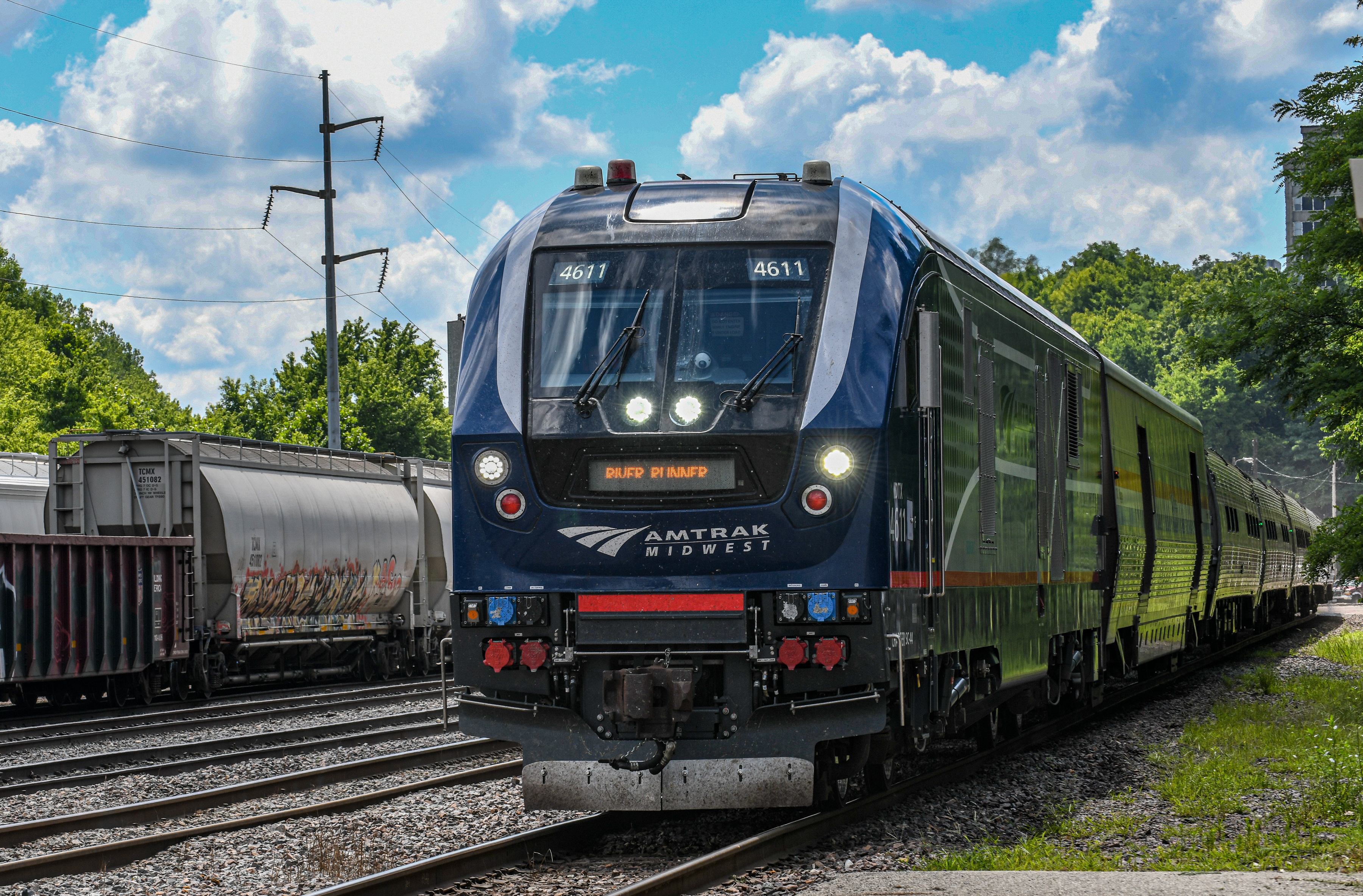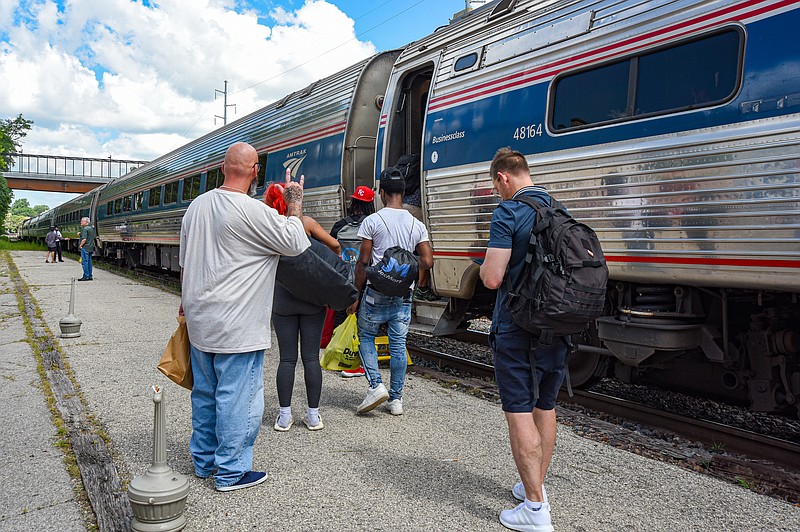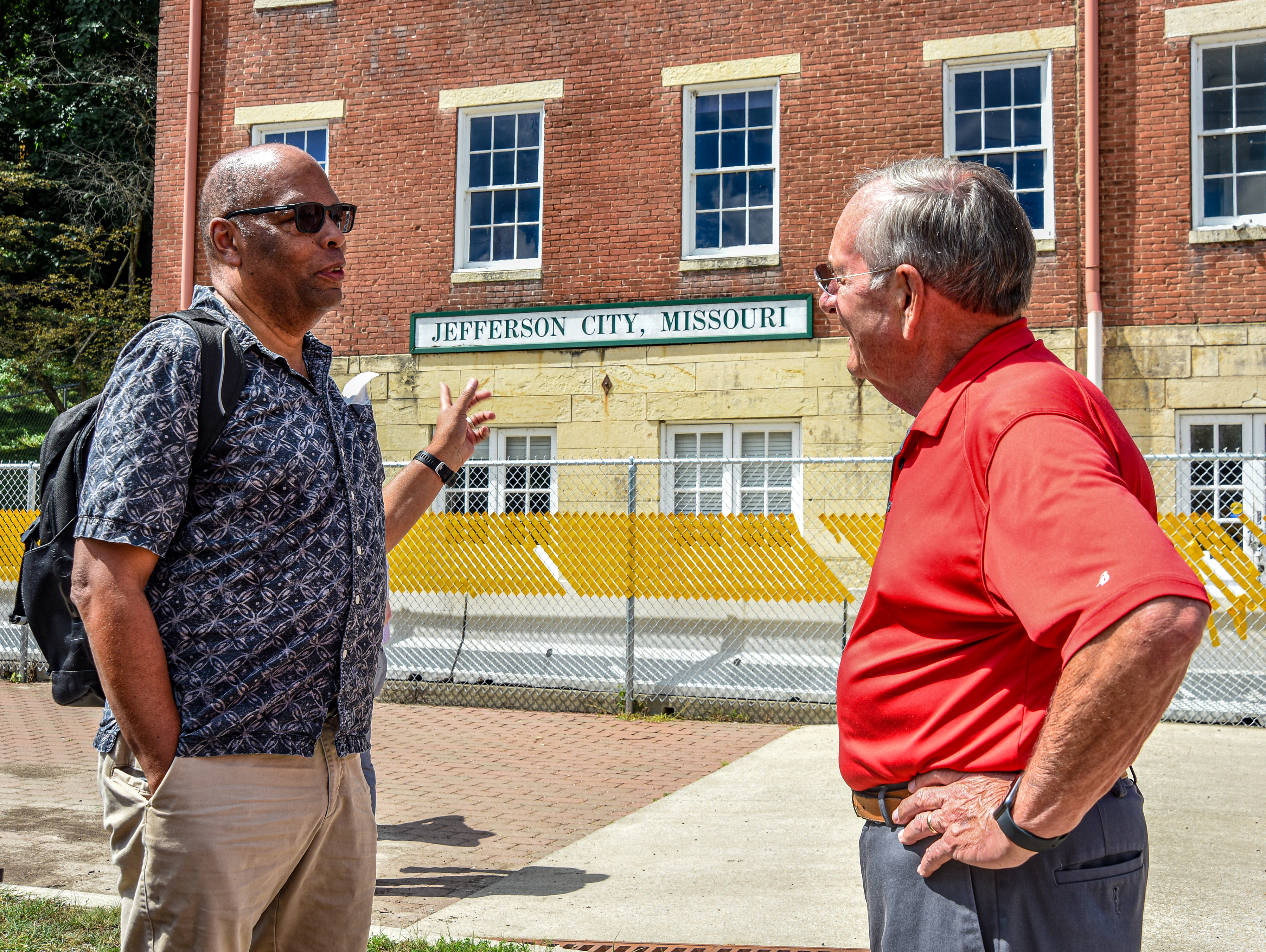On the day they celebrated the restoration of two daily round trips across the state, officials with Amtrak also announced plans to make improvements around the area where passengers are picked up in Jefferson City.
With funding approved by the Missouri General Assembly and signed by Gov. Mike Parson, full service by Amtrak Missouri River Runner trains resumed Monday; it will continue through the end of the year.
The westbound train arrived just after 11 a.m., where passengers were greeted by local and state officials with refreshments; it was something that was done at other stops along the train route. Amtrak officials were also on the train and spokesman Marc Magliari said they thanked the lawmakers for their support.
“They have spoken — for the best utility, we need a train that leaves St. Louis and Kansas City in the morning and St.Louis and Kansas City in the afternoon so people can do day trips,” Magliari said. “Look at the people that are getting on and off our train today. This couldn’t work with just one round-trip.”
Despite running just one daily cross-state train the first five months of the year, passenger counts for the River Runner show numbers on the upswing from 2021-22.
According to officials with the Missouri Department of Transportation, ridership for January-May 2022 was 34,074, compared to 24,992 for that same time in 2021.
The number of passengers getting on in Jefferson City also increased during the first five months of the year, with 4,034 people boarding trains this year, compared to 3,367 last year during that period.
People who got off the train at Jefferson City also went up, with 3,367 arrivals this year and 3,133 last year.
“Now we can talk about building our network and maintaining what we have as a foundation to grow from,” Magliari said.
Already the Legislature and Gov. Parson had approved $14,279,608 to be allocated toward renovations of the Union Hotel, built in 1855 and part of the Jefferson Landing State Historic Site, which had the Amtrak station waiting room until 2019. A structural inspection of the building, which is owned by the Missouri Office of Administration and managed in cooperation with the state Department of Natural Resources and Jefferson City, determined there were significant problems with the structure, and it was closed.
On Monday, Magliari announced Amtrak would fund the upgrade of the platform at the Jefferson City stop.
“We need a better ADA-compliant platform, and that’s not what we have here now,” Magliari said. “Things are going to be fixed.”
Magliari said the work would cost several million dollars and ground would be broke sometime next year. Officials with the Office of Administration estimated the Union Hotel project could take a year for design with a two- to three-year construction schedule.
“By the time the Union Hotel is fixed, we’ll be working to get the platform upgrade done, too,” Magliari said.
A temporary Amtrak station in the parking lot of the Jefferson Landing State will remain in operation until the hotel renovation is completed.
Amtrak operates the service under a contract with MoDOT. Federal law requires states to pay a portion of the cost of certain Amtrak trains. All of the state’s funding comes from its general revenue fund.
After Parson signed the legislation, MoDOT was given $13.25 million for two daily round-trips. Last year, MoDOT was given $10.85 million. It funded two round-trip trains from July through the end of December 2021 and one daily round-trip from January through June of this year.
Before the legislative session began, MoDOT officials said lawmakers told them they were not to go into arrears with the service and going back to one train would allow them to balance the budget.
Local state Reps. Dave Griffith and Rudy Veit said they supported the funds to get the second train back in service. The Republicans said they were told by constituents how vital the second train was to them.
“Some of them start here to use the train to do long trips to other parts of the United States,” Veit said. “With the high price of gasoline, we’re getting more and more reliant on other transportation modes, especially for those who can’t afford the gas or a car to take them to where they need to go. I’ve got people who told me they take the train just so they can go to see or take care of their grandchildren in St. Louis.”
“We want to address the needs of those who don’t have the money to get to other parts of the state and having two trains allows them some more options,” Griffith said.
Both men agreed that having two cross-state trains should be available 365 days a year and not just for the last six months of the year like happened last year and this year.
“The needs of the people are not going to go away,” Griffith said.
Veit added, “I believe once people start using it again twice a day, and it’s shown that it’s reliable and convenient, I think the support will be there because as long as there’s higher gas prices we’ll see more people using mass transportation systems.”
A pre-pandemic study of the Missouri River Runner found the service generates more than $200 million in annual economic impact in Missouri. It also supports more than 1,250 jobs in communities across the state.
Diane Gillespie, executive director of Jefferson City Convention and Visitors Bureau, said they are working to better track the financial impact of Amtrak visitors.
“We have seen we’ve missed this aspect, especially in tracking our tour numbers at the Missouri State Prison,” Gillespie said. “Thanks to having the second train, people can come here in the morning, spend time touring Jefferson City and head back home on the evening train.”
Gillespie noted many lawmakers from St. Louis and Kansas City will take the train to Jefferson City and rent a car for a week to get around town while the Legislature is in session.
Among those getting on the morning westbound train in Jefferson City was Charlie Nilon of Columbia. He thanked the lawmakers for giving the funds for the second train.
“My wife works at Lincoln University, and there were times I would drive down, pick up my wife from work and then we’d take the train to St. Louis to see our daughter,” Nilon said. “Not having the second train made it less convenient for us.”
Magliari said, “People all over the state have come to MoDOT and said they want to talk about service. There are people in Hannibal who want to connect to Quincy and maybe St. Louis. We have people in St. Joseph who want to look at back-and-forth service to Kansas City and maybe all the way up to Omaha.”
 Amtrak official Derrick James, second from left, visits briefly on Monday, July 18, 2022, with Mid-Missouri elected officials in Jefferson City to thank them for their support and about future plans for the train service. On hand to greet the Amtrak representatives were state Sen. Mike Bernskoetter, right, Mayor Carrie Tergin, second from right, state Rep. Rudy Veit, left, and state Rep. Dave Griffith, middle. (Julie Smith/News Tribune photo)
Amtrak official Derrick James, second from left, visits briefly on Monday, July 18, 2022, with Mid-Missouri elected officials in Jefferson City to thank them for their support and about future plans for the train service. On hand to greet the Amtrak representatives were state Sen. Mike Bernskoetter, right, Mayor Carrie Tergin, second from right, state Rep. Rudy Veit, left, and state Rep. Dave Griffith, middle. (Julie Smith/News Tribune photo) The westbound Missouri River Runner Amtrak train pulled into the Jefferson City depot Monday morning, July 18, 2022, at 11:06 where Amtrak officials were greeted by local elected officials, representatives of the Jefferson City Convention and Visitors Bureau and Chamber of Commerce. Monday started the renewed schedule of two eastbound and two westbound trains each day instead of one each. (Julie Smith/News Tribune photo)
The westbound Missouri River Runner Amtrak train pulled into the Jefferson City depot Monday morning, July 18, 2022, at 11:06 where Amtrak officials were greeted by local elected officials, representatives of the Jefferson City Convention and Visitors Bureau and Chamber of Commerce. Monday started the renewed schedule of two eastbound and two westbound trains each day instead of one each. (Julie Smith/News Tribune photo)

